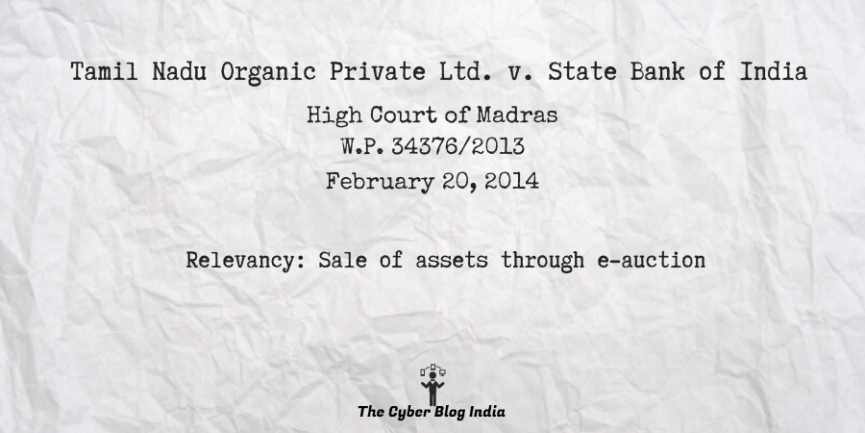Tamil Nadu Organic Private Ltd. v. State Bank of India

Tamil Nadu Organic Private Ltd. v. State Bank of India
AIR 2014 Mad 103
In the High Court of Madras
W.P. 34376/2013
Before Justice M. Jaichandren and Justice K. Kalyanasundaram
Decided on February 20, 2014
Relevancy of the case: Sale of assets through e-auction
Statutes & Provisions Involved
- The Information Technology Act, 2000 (Section 1(4), 2(p), 2(q), 2(w), 3, 10A, 35(4), Schedule 1)
- The Securitisation and Reconstruction of Financial Assets and Enforcement of Security Interest Act, 2002 (Section 12, 14, 34, 41)
- The Recovery of Debts Due to Banks and Financial Institutions Act, 1993 (Section 29)
- The Income Tax Act, 1961 (Schedule 2, 3)
- The Railways Act, 1989 (Section 55, 56)
- The Constitution of India, 1950 (Article 73, 162)
Relevant Facts of the Case
- The writ petitions were filed challenging the constitutional validity of the procedure adopted by the Banks in conducting e-auction sale for secured assets under the SARFAESI Act.
- Various contentions were raised by the petitioners stating that the e-auction procedures followed by the Respondents and the authorities concerned are arbitrary, illegal and unsustainable in the eyes of law.
- The Respondents state that e-auction sale process has been followed with the main object of eliminating the cartels and the syndicates operating with mala fide intention and causing heavy financial loss to the owners of the properties.
Prominent Arguments by the Advocates
Mr Sethuraman, Counsel on behalf of the Respondent:
- Section 10A of the Information Technology Act validates contracts formed through electronic means and enable the use of electronic means for the conclusion of agreements, contracts and other purposes. Hence, it can’t be said that the procedure adopted by the Bank by way of e-auction is bad in the eyes of law.
Devadasan & Sagar, Counsel 1 on behalf of the Petitioner:
- Section 1(4) read with item 5 of the First Schedule of the Information Technology Act, 2000 prohibits the Respondent from selling the assets through e-auction. The said provision only relates to a contract for the sale or conveyance of immovable property or any such interest.
Mr R. Rajagopal, Counsel 2 on behalf of the Petitioner:
- The service providers utilised by the Respondent do not have legal recognition. They cannot be acknowledged as ‘intermediaries’ as defined under Section 2(w) of the Information Technology Act, 2000. Such a system where there would be no accountability on part of the service providers would be detrimental to the interests of the petitioners, who are owners of the security assets.
Opinion of the Bench
- It is undoubted that the Respondents have chosen to adopt the method of e-auction sale with the bona fide intention of obtaining the best possible price for the said properties.
- The e-auction sale procedures followed by the Respondent-Banks would go a long way in reducing the unhealthy practices in the public auction sales of the security assets.
- From the records available, it is clear that the personal details of the bidders participating in the e-auction are kept confidential.
- The Bank’s decision to resort to an e-auction is within its power under Rule 8(5) of the 2002 Rules and the notice issued by the Bank for e-auction is within its jurisdiction and cannot be said to go beyond the said rules.
Final Decision
- Development in technology to improve efficiency and transparency in the auction system cannot be interfered.
- The process of e-auction sale followed by the Respondent-Banks was just a small step taken towards adopting modern technologies in implementing the procedures provided by law.
- Hence, the court found it appropriate to dismiss the writ petition with some observations and directions. The other miscellaneous petitions connected to the case were also closed. No order was made regarding the costs.
